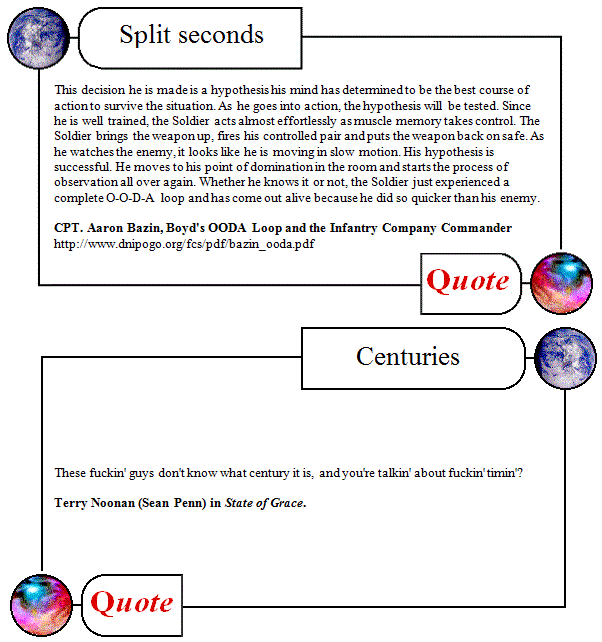About Me
Recent Comments
- Barbara Flaherty on Contact Me
- Tim Furnish on Guest Post: Recommended readings, real and imagined for Military Leaders—Part II. Timothy R. Furnish, PhD
- L. C. Rees on Guest Post: Recommended readings, real and imagined for Military Leaders—Part II. Timothy R. Furnish, PhD
- zen on Guest Post: Recommended readings, real and imagined for Military Leaders—Part I. Timothy R. Furnish, PhD
- TR Furnish on Guest Post: Recommended readings, real and imagined for Military Leaders—Part I. Timothy R. Furnish, PhD
Pages
-
Archives
Meta
zenpundit.com is proudly powered by
WordPress
Entries (RSS)
and Comments (RSS).




February 1st, 2011 at 1:13 pm
Now I’m thinking of a new game, Angry Boydz. Throw pigs for an OODA loop!
February 3rd, 2011 at 3:13 am
Hi Charles,
.
Good juxtapositioning.
.
The top quote reminds me, in spirit, of Musashi. The bottom, of dreamtime. The linear, chronological, sense of time is at odds with the perceptual quality of timelessness or being out of sync with normal time
February 3rd, 2011 at 4:56 pm
Hi Zen, thanks — Bryan, whoosh!
.
It seems to me there are three speeds of mind, which we could call instinctive (the kind that takes your finger off a hot plate), rational (most of what we call thinking, talking), and mulled (minimally, the stuff you need to sleep on, and at best, the eventual discovery, aha! moment or solution of a koan), two modes of time (subjective and objective), and the passage of fads, fashions, zeitgeists and ages ("right out of the twelfth century" "bomb them back into the stone age"), with considerable overlap ("the future is already here — it’s just not very evenly distributed").
.
And there’s Boyd.
.
There are digital and analog clocks, and my son finds many of his high school peers can’t read the analog ones the school uses. There’s cyclical time ("eternal recurrence") and progressive time. Also important, perhaps, are synchronization, synchronicity, coincidence, serendipity and teleology.
.
Then there’s the wonderful time my friend Wallace Black Elk used, when he told two friends of mine who were going on vision quests to fast "from midnight" – when one complained that the other had eaten watermelon at 1.30am, Wallace explained that that was fine, night was "when you sleep" and midnight therefore "in the middle of that, after you’ve gone to sleep, before you wake up" — which is one form of "Lakota time", as in, "you arrive when you arrive"… Perhaps we could call that "loose-fitting time".
.
From a writer’s point of view: nominal and real deadlines.
.
Come to that, there’s time, and then for theological completeness I should also mention eternity — which is often thought to mean "subjective time continuing in parallel to clock time beyond the death of the body" but in fact refers more accurately to"timelessness", and frequently "timelessness within the moment".
.
Been meaning to say that! There’s an interesting potential study in there, eh? seeing how they all interact and influence us.